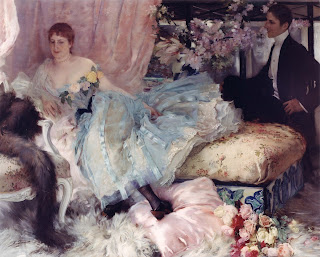Henri Lucien Doucet: After The Ball
Henri Lucien Doucet was born on 23rd August 1856 in Paris. He studied under Boulanger and Lefebvre. He painted in oils and pastels and his subjects varied from historical scenes and portraits but he is best known for his genre scenes. He debuted at The Paris Salon in 1877 at the tender age of 21.
He went on to have a successful career that won him many plaudits and awards. These included ‘Le Grand Prix de Rome’ in 1880 and most notably a Gold Medal at l’Exposition Universelle de Paris in 1889. The paintings that Doucet submitted to the 1877 Salon caused something of a minor scandal - most notably those painted from the time he spent at the Villa Medici. He sent a painting entitled Berenice to Rome. The institute there refused to exhibit the painting at l’Ecole des Beaux-Arts because of “its impudent suggestion”. A confrontational figure, Doucet quarrelled with many of his contemporaries, most memorably with Cabat, who was at the time director of the French Academy in Rome. Cabat had taken exception to the daring composition and timbre of his painting entitled Harem. This elevated Doucet to something of a cause celebre.
In his first canvases Doucet showed the great debt he owed to Bastien-Lepage but on his return to France he had lost much of his emotional fervour and zeal. He became a more mundane and reserved painter often working in pastels. The painting After the Ball shows all the daring that had so upset Cabat 100 years previously. There is a tension that exists between the two figures that must, to a conservative Victorian public, have seemed most improper. After the Ball is a fine example of Doucet’s early work. [Williams & Son]

No comments:
Post a Comment